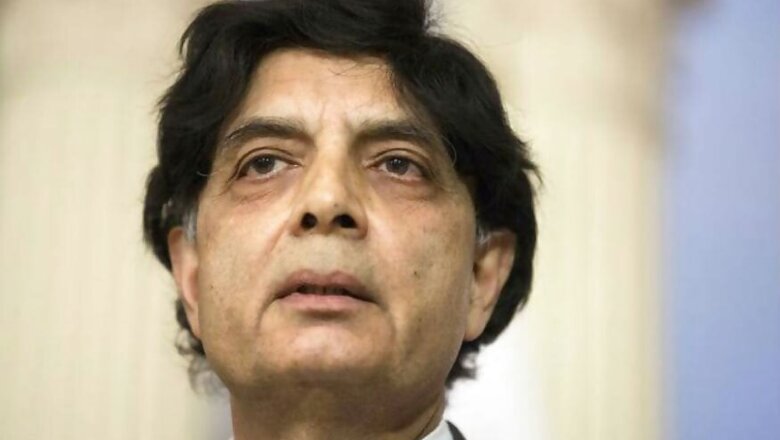
views
Islamabad: Pakistan's former interior minister Chaudhry Nisar Ali Khan on Sunday said the "uncooperative attitude" and "stubbornness" of the Indian government has been the biggest obstacle in the Mumbai terror attacks trial reaching a conclusion, according to a media report.
Nisar's comments came in the wake of a statement by ousted prime minister Nawaz Sharif who questioned Pakistan's policy to allow the "non-state actors" to cross the border and "kill" people in 26/11 Mumbai terror attacks.
In an interview with the Dawn, Sharif who has been disqualified to hold public office for life by the Supreme Court in the Panama Papers case, criticised the delay in the conclusion of the Mumbai attacks trial.
Without naming Mumbai attack mastermind Hafiz Saeed and Maulana Masood Azhar's militant organisations, Jamaat-ud-Dawah and Jaish-e-Mohammad, Sharif said: Militant organisations are active in Pakistan. Call them non-state actors, should we allow them to cross the border and kill over 150 people in Mumbai? Explain it to me. Why can't we complete the trial."
Reacting to Sharif's remarks, Nisar, under whose watch the Federal Investigation Agency (FIA) was investigating the Mumbai attacks, said the Indian government was to blame for the hold-up in the Mumbai attacks trial, the Dawn reported.
"I say with full responsibility that the delay and slow pace of the Mumbai attacks-related case in Pakistan was not Pakistan's doing but was a result of non-cooperation and stubbornness by India," said the disgruntled PML-N member.
He said since the attack took place in the Indian financial capital, it was the Indian government which possessed "90 per cent of the evidence and facts" of the incident.
"Despite repeated efforts, India refused to share those facts and evidence with FIA and the investigative committee formed by Pakistani courts," he claimed.
He said, "There was no bigger evidence of the Indian government's lack of interest in taking the case to its end than its refusal to allow FIA to question the only living proof of the attacks: Ajmal Kasab."
"Kasab was hanged in such haste, so that the Mumbai attacks could be used as a tool for Pakistan bashing across the world on political basis," he said.
He claimed that although Pakistan had cooperated with the Indian government for information-sharing regarding every terrorist incident, India had not reciprocated for incidents taking place inside Pakistan.
The Mumbai attack case has entered into the 10th year but none of its suspects in Pakistan has been punished yet, showing that the case had never been in the priority list of Islamabad that appears to be keen to put it under the carpet.
A number of Pakistani witnesses both official and private testified and provided evidence against the seven accused, but the Pakistani authorities have been insisting on sending Indian witnesses for reaching a verdict in the case.
Some 166 people were killed in the attack carried out by 10 LeT men. Nine of the attackers were killed by police while lone survivor Kasab was caught and hanged after handed down death sentence.




















Comments
0 comment